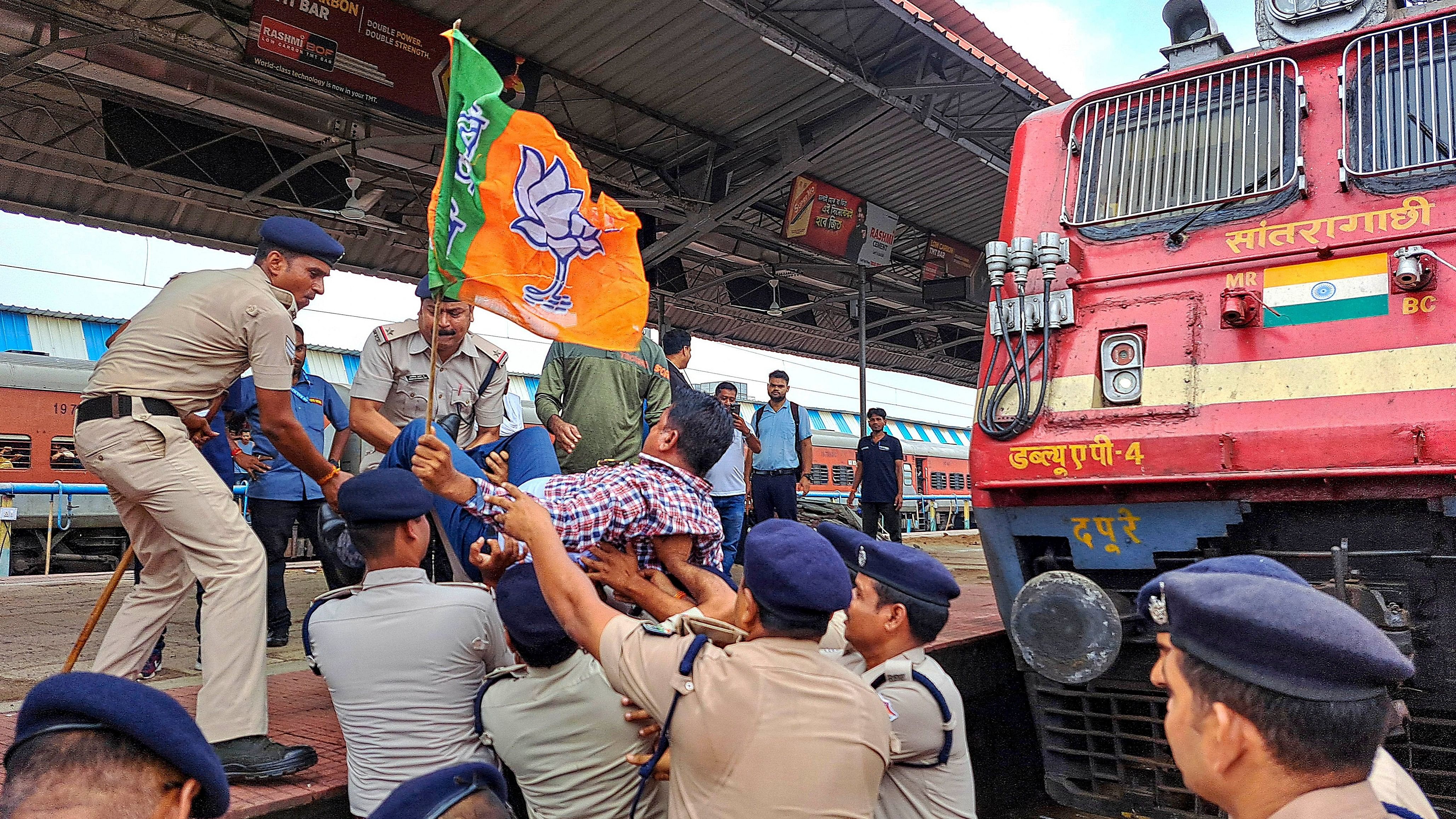
West Medinipur: Police personnel detain a BJP worker as party activists block trains at Kharagpur railway station during the party's 12-hour general strike in Bengal to protest the police action against participants of Tuesday's Nabanna Abhijanrally which was held against the Kolkata RG Kar incident, in West Medinipur, Wednesday, Aug. 28, 2024.
Credit: PTI Photo
The rape and murder of the postgraduate medical student that occurred in the early hours of August 9 on the campus of R G Kar Medical College and Hospital in Kolkata was triply horrific.
First, an attack so savage and barbaric should never have occurred anywhere, anytime. Second, it should not have occurred in the secure environment of a medical college where students were in residence. It was a second home. Third, there shouldn’t have been any attempt at a cover-up — which brings us to the myriad failings of the state government.
Given the circumstances, transparency was incumbent on the Trinamool Congress government. The investigation ought to have taken off straightaway; and, the public and family ought to have been kept in the loop from the get-go. Second, the police should have immediately taken on board the numerous ramifications of the crime. Instead, the police seemed to have struggled to get going. There were clear attempts to shield people who had been, it appears, guilty of corrupt practices. The principal of the college, Sandip Ghosh, should have been proceeded against without delay, pending investigation. The same goes for subordinates who could reasonably be suspected of complicity from the outset.
But here we must enter our first caveat. The public space is being clogged by conspiracy theories, very conceivably multiplied by the Bharatiya Janata Party (BJP)’s toxic propaganda machine. We’ve heard about payola for marking tests, an organ-harvesting racket, and sleaze. The point is not whether any element of the ‘many-headed conspiracy’ is real or not; it is about balance.
Whatever the public and the R G Kar community have wanted is now on the table. The Supreme Court of India has taken cognisance of the crime, and the situation arising from it. It has designated a task force to investigate the issue of the safety of healthcare professionals at their workplace, and in and around medical institutions in general. It has also given protection to protesting citizens rallying against the government’s failings and demanding justice. We must be careful, however, not to personalise, and thereby tribalise, the idea of justice. Formally, justice is what the courts decree it is. Essentially, it is something intrinsically societal. The punishment for transgressions is so that the social contract and fabric remain intact.
In Kolkata, the Calcutta High Court has handed over the investigation into the crime and the circumstances surrounding it to the Central Bureau of Investigation (CBI) — in other words, we assume we will get to the heart of even the most outré of conspiracy theories. It is monitoring the progress of the probe on all fronts. The Enforcement Directorate is investigating the financial ramifications of the crime.
The call for justice is visceral, and natural. It must be satisfied. But here again, we need to maintain balance. Those genuinely seeking justice will be aware that shutting Kolkata down day after day will not help expedite the process. Nor, respectfully, will severely compromising health services and victimising the neediest among those in need of, sometimes critical, attention. Junior doctors may productively ponder the ethics of a prolonged strike.
Which brings us to the protest. It may well have begun with citizens who were forced by the horror to examine their brutalised conscience, following, of course, the spontaneous reactions of students and doctors. But, clearly the protests have been hijacked by the Sangh parivar. All concerned must realise that going down the slippery slope of civil unrest serves no one’s purpose other than that of the mendacious Right wing.
We must blame Chief Minister Mamata Banerjee for giving the idea of widespread protest respectability by absurdly hitting the streets herself. It was a shameful abdication of her responsibility to govern. Under the cosh now, better sense has prevailed. The August 27 march on Nabanna — the state’s secretariat — called by some groups has now been met with a firm response because, not unexpectedly, those with an investment in lawlessness have indulged in violence.
It is to be hoped that the slide towards civil unrest, without any purpose other than compromising the government and the daily inconveniencing of the lives of ordinary citizens, will now begin to taper off.
We should reiterate the central point in conclusion: The investigation is in the hands of central agencies; and it’s being monitored by the high court, with the apex court also keeping an eye on developments. It’s time to take a deep breath and allow quotidian life to proceed uninterrupted.
(Suhit K Sen is author of ‘The Paradox of Populism: The Indira Gandhi Years, 1966-1977’.)
Disclaimer: The views expressed above are the author's own. They do not necessarily reflect the views of DH.